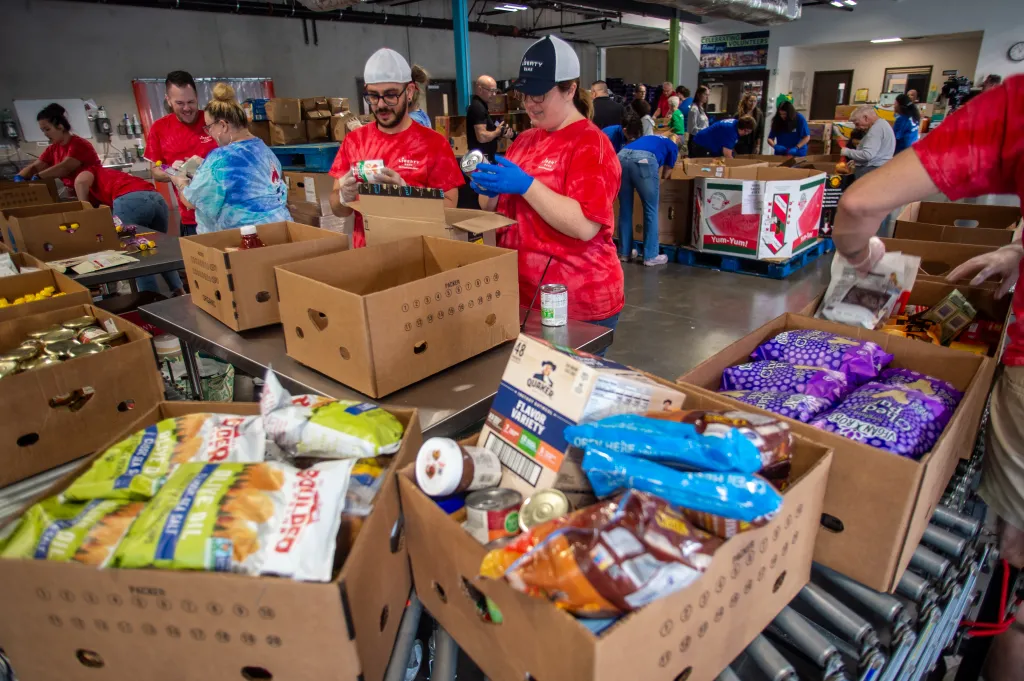Copyright Hartford Courant

Gov. Ned Lamont said Monday that he is preparing a proposal with legislative leaders to set aside money to address cuts due to the federal government shutdown including lapses to SNAP. “This is priority No. 1,” Lamont said at a press conference Monday at the Hands on Hartford Manna Food Pantry in Hartford. “We are going to have enough money in place on a bipartisan basis to make sure we can take care of people as long as it takes, when it comes to WIC, when it comes to SNAP cutoff, when it comes to LIHEAP going forward,” the governor said, surrounded by officials from the Office of Early Childhood and other state and federal leaders, including U.S. Sen. Richard Blumenthal and U.S. Attorney General William Tong. The money could be allocated in the upcoming special session, scheduled for next week. Asked by reporters how much funding would be set aside, the governor said the number is yet to be determined but that an agreement is in place. “Unlike most other states, we have a $4 billion dollar rainy day fund to take care of eventualities like a recession, like the federal government cutting off their obligations to people like this,” the governor said. The governor made the announcement shortly before President Donald Trump’s administration signaled that it will only partially fund SNAP after a pair of judges’ rulings required it to keep the food aid program running using available contingency funding. The U.S. Department of Agriculture had planned to freeze payments to the Supplemental Nutrition Assistance Program starting Nov. 1 because it said it could no longer keep funding it due to the shutdown. The program serves about one in eight Americans and is a major piece of the nation’s social safety net. In Connecticut, more than 360,000 residents receive SNAP benefits. The attorney general stated in the press conference that if SNAP is only partially funded, it could result in a delay in people receiving their benefits as the new numbers are calculated. “There are people right now in Connecticut who have EBT cards that don’t have money on them,” Tong said. “People who don’t have access to food right now, which is an utter and complete outrage. People should not go hungry in the wealthiest nation on earth.” Janet Bermudez, executive director of Hands on Hartford Manna Food Pantry, said Monday that she continues to “see our lines getting longer and have issues keeping our shelves stocked to meet the needs of our neighbors.” Penny Parkes, a Fairfield resident, shared how the shutdown is directly affecting her life. “I am a mom,” she said, describing her son Eric, who is 33 years old and has a genetic disorder and has the mentality of a 5 year old. “He has everything,” She said. “Autism, ADHD, and seizures. He lives in a group home sponsored by Ability Beyond. Ability Beyond is mostly funded by Medicaid. To say that I am terrified is an understatement. I don’t know what we will do if the agency has to close down. This can happen to anybody. We were just regular parents and have a son with a genetic disorder. We are the real people that this affects.” The Trump administration had previously rejected using more than $5 billion in contingency funds to keep the SNAP program flowing into November. Tong said the president is “purposely and illegally starving American families for political leverage. “We sued to force him to release these contingency funds paid for by taxpayers and obligated by Congress to help Americans buy food at a time when grocery prices are already out of control,” he said. “Because of our lawsuit, these dollars now will make their way to EBT cards, and that is important relief for the 366,000 people in Connecticut relying on these funds to eat. But this is not close to good enough. We are evaluating all legal options to fully free these funds.” Federal judges in Massachusetts and Rhode Island ruled separately but similarly Friday, telling the government that it was required to use the contingency fund, which has over $5 billion, to pay for the program, at least in part. The benefits and administration cost over $8 billion per month. Tong joined a coalition of 21 other attorneys general and three governors in suing the United States Department of Agriculture and its Secretary Brooke Rollins for suspending the SNAP program, which helps more than 40 million Americans buy food, according to the attorney general’s office. Lamont previously said the state would provide $3 million on an emergency basis to partially fill the gap. To distribute the food, the state is providing the money to Foodshare, the regional food bank supplier that provides meals around the state year-round. “These empty shelves will be filled with fresh produce,” Lamont said. “We can’t wait for Washington. The state of Connecticut can’t make up for Washington’s failure. They have a legal obligation to provide this funding. We are doing what we can to help people in the meantime.” The governor added if the need continues, that the state can double down on aiding Foodshare and add resources. Tong interjected that there is one person who can fix this now, pointing to Trump. “We should not be fighting amongst ourselves as to how we are going to comply or capitulate and live with these unlawful actions,” he said. “They are unlawful and they are wrong. We are going to do what we can. One person is responsible for this pain and suffering.” Blumenthal said he has seen many lines at food pantries. “People have never asked for anything before and people are really hurting as a result of this shutdown,” Blumenthal said. “President Trump is seeking to maximize the pain, inflict additional suffering on people as a result of this shutdown to put more political pressure on Democrats in Congress but also simply to inflict pain. He has stopped the SNAP program even though he has the authority and funding to provide it.” Connecticut Republicans have pushed back on the Democrats’ narrative, saying that while state officials should do more to help people struggling with the shutdown’s effects, its congressional delegation needs to reopen the government. “Senate Democrats have offered nothing but posturing instead of preparing to tap our $4.3 billion Rainy Day Fund to help Connecticut families facing food insecurity during a federal shutdown driven by their party in Washington,” House Republican leader Vincent Candelora said last week. “That’s not just wrong — it’s a choice. They’d rather score political points against President Trump and Republicans at every level of government than develop an actual plan to help their constituents. These are the same state legislators who cook up endless schemes to squeeze taxpayers and expand government programs—but suddenly can’t figure out how to use our reserves in a crisis? There’s nothing ‘morally courageous’ about letting people go hungry while sitting on billions.” Senate Minority Leader Stephen Harding called on Connecticut’s congressional delegation to “join Republicans in voting to reopen the government and resolve this crisis. “Five major employee unions have called on Senate Democrats in Washington DC to change their position and vote to reopen the government. We view that as an encouraging development,” he said. Blumenthal said there is good news in Washington, with conversations beginning about ending the shutdown. “They are only beginning but again Trump could end this shutdown this afternoon by making a commitment that the health care tax credits will extend beyond the end of the year,” he said. “That is what we have insisted on as a commitment. The majority leader of the Senate and the Speaker of the House will make no commitment that is worth anything without the president being at the table. People can’t afford to get sick on Donald Trump’s timetable. They need these tax credits right now.” The federal government shut down as Democrats in Congress demanded negotiations to extend enhanced tax credits that have helped people buy coverage the past few years. Republicans say they won’t negotiate until Democrats vote to reopen the government. Tong said the president is deciding to use his authority to make people go hungry. “This is so counter to law but also counter to the way Americans have always treated each other,” Tong said. “This has never happened before in what would have been the second longest shutdown. They funded SNAP and people got food on the table for their children. SNAP is mandatory. There is no discretion whether SNAP gets funded. More than 100,000 children in Connecticut and almost 400,000 people in Connecticut, so many households are supposed to be getting food assistance right now. Instead, the president is seeking to gain leverage in a political stalemate. He is weaponizing hunger and health care.” The Associated Press contributed to this article.



